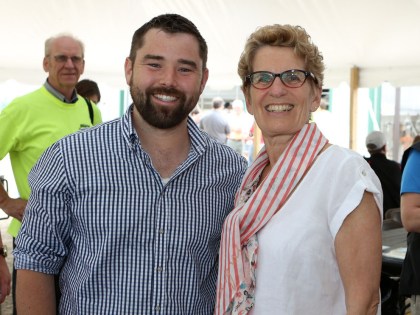Genuine, authentic, caring…when was the last time we heard these words being used to describe a politician? Yet as I travel around meeting people throughout the riding these are the words people use when they talk about Kathleen Wynne.
A couple weeks ago I was at Breakfast on the Farm, which Premier Wynne attended, and I was amazed as she took time to meet families that had attended the event. She made her way through the tent slowly, happy to speak with anyone who wanted to talk and to my delight, insisted that she make time to get a full tour of the dairy barn from my good friend Mary Ann Dore, who is an owner of Heritage Hill Holsteins where the event was being held.
Premier Wynne took a few minutes to speak with yours truly and our conversation was incredibly encouraging. Our Premier demonstrated to me that she understands the importance of agriculture and agri-food and she is committed to ensuring our rural communities have every chance to succeed. She even touched on a subject that is near and dear to my heart, the need to build a respect and understanding for rural life and farming among urban Ontarians. I have spent countless hours trying to open a window into a farmer’s life for city dwellers through my writing, video creation, and volunteering at events.
I know that Kathleen Wynne has valued bridging this gap between the cities and countryside from her first term as an MPP. Kathleen Wynne, who as MPP for Don Valley West, reached out to her colleague, John Wilkinson, and the two of them created what became known as AG101. This annual summer event brings MPPs and staff from Toronto to Perth-Wellington in order for both parties to share and build an understanding of how we all depend on one another in this province. Agriculture is extremely important to me, and I am proud that Kathleen Wynne showed leadership by working to bridge the gap. Sharing my experiences as a farmer with those from the large cities has been a goal of mine for a very long time. Kathleen Wynne understands and shares these values and this fact played a key role in my desire to join Team Wynne.
To me, Kathleen Wynne eschews the negative image of a politician that pervades our lives; she is an excellent representative to emulate. If someday people refer to me as an MPP who genuinely cared about them, as a person who was honest and stuck to their principles then I can’t ask for anything more.

You need to be a member of Ontario Agriculture to add comments!
Join Ontario Agriculture